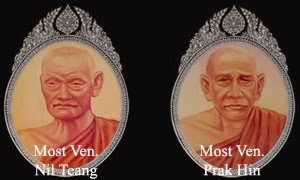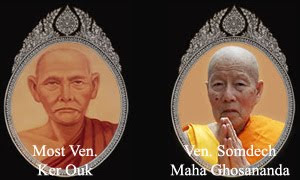My monastic life began as a novice at the age of eighteen. Later when I reached the age of twenty, I was ordained as a monk. My life as monk is a spiritual quest, freed from worldly burdens and clinging. I embarked upon this life to wage a war against all defilement. My novicehood was in a way a preparation for the hardship and challenges that lay ahead in the life of a monk. In the spiritual quest that I am striving to lead, the numerous conflicts that arise are always internal and the battlefield is my own self or mind. I have realized time and again the opponents in this spiritual war was parts of my own mind and the victory or defeat is dependent solely on my own effort.
I have realize that if one takes monkhood as a life of action, one can make the most out of it, whereas, on the other hand, if one takes it as a life of inaction or passivity, one can find nothing except for boredom, ennui, idleness and lethargy. Like in all other activities, motivation is very important to achieve success. However, in monkhood motivation has to be grounded on moral foundations.
The moment I shaved my hair and eyebrows, was clad in yellow robe and took the vow to strictly abide by the 227 precepts essential for a monk, my life in a way was freed from worldly burdens. From then on, I depended on the laity for my four primary needs, clothing, food, shelter and medicine. Does this mean that I have become a parasite or an escapist? Not really, if you consider the challenges involved in the austere life of a monk. The realization of these challenges may come as a spark to the intuitive one, but to the commoner or the inexperienced one, it is a process to be undertaken and constantly practiced day in and day out. What are these challenges? How much have I succeeded in confronting them? These and a number of other questions have become perpetual queries for me. You may say that I have become rather self-introspective.
The first challenge for me is to make morality a practiced reality in life, not just a mere choice in situational time and space. My life is based on moral foundations. Had it not been so, I would have been a hypocrite in the guise of a monk, deceiving all lay devotees and myself. The adherence to moral values had made me extremely conscientious in every action, whether physical or mental. But this not just enough or ultimate for me.
As a Buddhist monk, I need to rationalize my ethical standpoint. Most lay people practice moral values too, for a peaceful and happy co-existence in society. So how does a monk’s moral standpoint differ from a layperson? Monks have to practice detachment along with morality, which is not always necessary for a layman or a laywoman. In other words, as a monk I have to control and overcome every temptation, desire or strong liking. For instance, when I go for alms every morning, I am grateful to the laity, but I have neither any demand nor any clinging to what they offer. I share my food my fellow monks at the temple. While eating I concentrate on the process of eating in order to develop mindfulness, but never on the items of food and the pleasure of good taste. I join other monks in chanting before and after breakfast. These prayers are not mechanically repeated words, but are tools to realize the state-of-things or the situation itself, i.e. my dependence on the laity, my gratefulness towards them, my body’s requirement of food for nourishment and not for pleasure, etc. It is a great challenging to make detachment go hand in hand mindfulness and morality.
In the life of a monk, the attitude of detachment in life and its pleasure is symbolically expressed through the saffron-robe, the shaven head and eyebrows and the humble dwelling place-the Kuti. Well-maintained, well-groomed hair enhances the beauty of the face; likewise, colorful garments make the body appealing and attractive. But when I routinely stick to my three pairs of robe, like all other Theravada monks, my willingness to do so is a symbolic expression of monastic austerity and detachment from material luxury. In monastic life the body’s needs for comforts are kept minimal. For instance, to avoid oversleeping and laziness I shun for using comfortable beds. This is because a simple lifestyle is indispensable for the spiritual enrichment of the mind.
Not only raiment, our body too is material/physical with all its sensual attributes. But when I contemplate on the three fundamental Buddhist concept-Anicca or impermanence, Dukkha or suffering, and Anatta or non-substantiality-it help me to be more detached from my corporeal reality. I can distance myself from my own body with the help of meditation. That the mind may overcome all physical and mental clinging that leads to all sorts of defilement, it is essential for me to practice formal meditation. Vipassana or Insight meditation can be practiced at every moment even while engaging in mundane activity. However, I prefer to practice method of concentrating on the process of breathing-inhalation and exhalation. This is a technique or rather a step in tranquil meditation practice, but one can use it for Insight meditation as well, especially while practicing sitting meditation.
On rare occasions, I have also practiced meditation in a very natural, quieter, at times, fearful setting like a forsaken cremation ground. My attempt as being taught by senior meditation masters is to accept fear within me, to confront it and eventually to overcome it. I admit that this kind of extreme situation is not always easy to endure for all. Most of the time we are in the midst of friends-safe and secure and seldom confront actual fear and lonesomeness. The temples are all lighted with electric lamps, so one can hardly experience darkness of the night. But on such occasions, when I involve in outdoor meditation I stand vis-à-vis with the stark realities of death, fear, decay and darkness.
In such moments, I try to be very objective in order to overcome my subjective fear. Like when the mirror reflects my own image and I instantly recognize it as none other, but my own reflection, I try to recognize fear as fear. I believe that when one sees the truth as truth, there is no futile attempt to run away from it. One just needs to confront it and be more objective. When I undergo periods of such rigorous mental training, I draw inspiration and courage from the life of the Buddha and his numerous faithful disciplines down the ages. What I gain most from these exercises is the power to gain control over my own mind. Patience, perseverance, endurance, detachment, objectivity, agility of mind, clarity of vision are other corollary gains.
Time and again, I have also realized that the Buddhist way of life is based on mutual co-existence of human beings and nature. When I am exposed to the natural elements during outdoor meditation practice, I ought to remind myself of the diverse elemental effects on our body. In the process I may endure and survive or simply parish. But for my own sake nature is not to be harmed or destroyed. As for instance, when poisonous creatures bite or sting me I am not to pursue them and kill them. The fear for such beings is to be overcome by oneself through compassion, tolerance, forbearance and detachment. Based on this principle, my worldview is one of natural and cosmic order of harmony. I think the environmentalists’ cry for the preservation of nature/ Eco-diversity is not contrary to the Buddhist way of looking at life and existence.
Thus, within the scope of my social responsibilities, I would like to devote myself to the propagation of Buddhist ideas/ concepts, precepts and principles. As a student at Mahachula Buddhist University, I used to actively participate in the Buddhist Sunday School Program, the objective of which had long since been the teaching of Dhamma to young children. Now I teach Buddhism to school students, it is my constant endeavor to interpret modern day life and situation from a Buddhist perspective, so as to encourage the younger generation to put Buddhism into real practice. It is natural for Thai children to develop respect towards the faith and belief of their parents and elders. But there is a need to guide the child to go beyond his/her customary adherence, so that Buddhism can be adopted as a way of life, a way to look at the world and not merely as a set of religious codes and ritualistic practices. My other social duties include: participating and conducting ordination ceremony, giving Dhamma Talks, occasionally offering ethical counseling to the laity, attending funeral services, chanting and teaching Dhamma to young novices.
Monkhood has not only offered me many challenges, but also helped me to broaden my mental horizon and widen the scope of my social responsibilities. It has nurtured and deepened my concern for humankind as a whole. It is my belief that I am treating the right path and I wish to continue along this path as long as possible.





0 comments:
Post a Comment